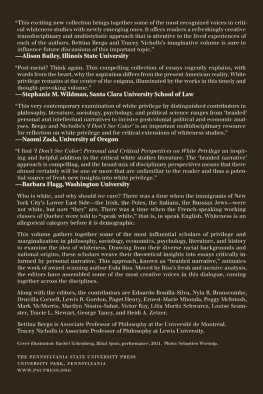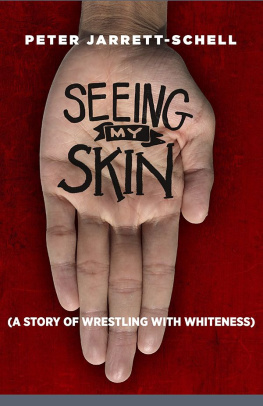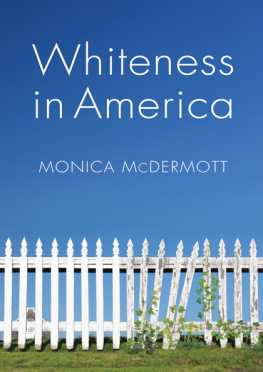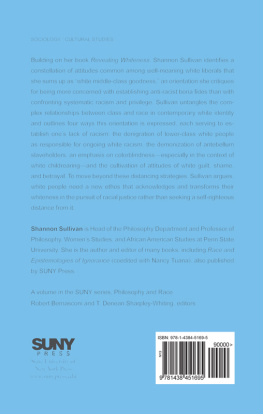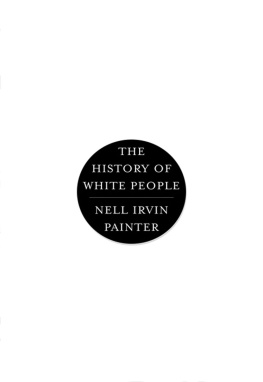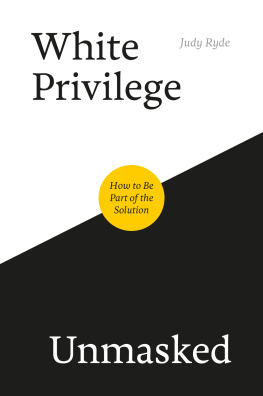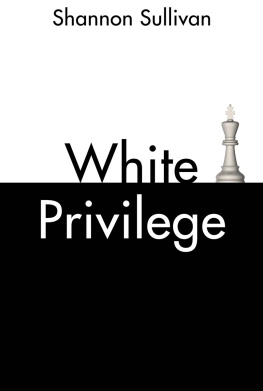I Dont See Color
I Dont See Color

Personal and Critical Perspectives on White Privilege
Edited by Bettina Bergo and Tracey Nicholls
The Pennsylvania State University Press
University Park, Pennsylvania
On the cover: Rachel Echenberg, Blind Spots, performance, 2011. Photo: Sebastien Worsnip.
The performance was visible through a translucent screen covered in round holes that separated the audience from the action. The screen flattened the live performance space into an image so that only certain details could be focused on at once. In doing this, the piece attempted to portray the blind spots of perception, forcing attention to shift between the visible and the experiential.
Variations on a repetitive action of filling a tall glass with water, drinking only half of it, and allowing the glass to slowly slip and crash to the ground, repeated for forty minutes.
Library of Congress
Cataloging-in-Publication Data
I dont see color : personal and critical perspectives on white privilege / edited by Bettina Bergo and Tracey Nicholls.
pagescm
Summary: A collection of essays weaving together theoretical insights from philosophy, sociology, economics, psychology, literature, and history, as well as the authors personal narratives, to examine the forms and persistence of white privilegeProvided by publisher.
Includes bibliographical references and index.
ISBN 978-0-271-06499-4 (cloth : alk. paper)
1. WhitesRace identity.
2. Racism.
3. Race relations.
I. Bergo, Bettina, editor.
II. Nicholls, Tracey, editor.
HT 1575. I 22 2015
305.809dc23 2014027258
Copyright 2015
The Pennsylvania State University
All rights reserved
Printed in the United States of America
Published by
The Pennsylvania State University Press,
University Park, PA 168021003
The Pennsylvania State University Press
is a member of the
Association of American University Presses.
It is the policy of The Pennsylvania State University Press to
use acid-free paper. Publications on uncoated stock satisfy
the minimum requirements of American National Standard
for Information SciencesPermanence of Paper for
Printed Library Material, ansi z39.481992.
Contents
Part 1:
Approaching White Privilege
Part 2:
The Images and Rhetoric of White Privilege
Part 3:
Troubling Privilege
Part 4:
Other Perspectives on White and Western Privilege
Having worked under the relentless command of an infant, I am convinced that one of the most curious cruelties of babies is the way they compel us to mercy. This mercy they draw from us may be beautiful, like all mercies, but it is not effortless.
For black people, Hilton Als writes, being around white people is sometimes like taking care of babies you dont like, babies who throw up on you again and again, but whom you cannot punish, because theyre babies. What a burden this mercy is. And what a tender metaphor Als offers for the burden our privilege imposes on others. Babies are made powerful, when we allow them power, only through their helplessness. It is one thing to understand ones privilege as a kind of power, but quite another to understand that power as a kind of helplessness.
Thats the life, old men used to joke with me as I pushed my baby in his carriage. They meant, I suppose, being constantly cared for and tended to by a woman. But neither the baby nor I believed that this was the life. We had both seen enough of helplessness to want something else for ourselves.
Babies, by nature, are not aware that they are babies. Once they can point at other babies and say baby, they arent really babies any more. So, too, with those of us who believe ourselves to be educators or executives or public servantsuntil we can point at each other and say baby, the humiliating truth remains evident only to those who serve us our pacifiers.
Privilege does not exalt us so much as it diminishes us, though we like to imagine otherwise. We like to imagine that it is a privilege to be privileged. Strange, that our fantasies would be such perfect inversions of what we live that they read like code or encryption. The powerful feel vulnerable and are plagued by fear, and those of us who live our lives as babies like to imagine others as infantile even as they care for us.
When a conference on whiteness was held at the university where a friend of mine teaches, she asked me, Why should we dedicate a weekend to study whiteness when its all whiteness studies all the time everywhere? What she meant, of course, was that when we study art history or anthropology or poetry we are very often taught in terms of whiteness, bounded within the limits of whiteness. But what happens to whiteness there is the opposite of studywhiteness isnt being looked at so much as looked through.
Looking at something weve been trained all our lives to look through can be like grasping water or examining glass. There may seem to be an artifact in the lens, but then we find that the artifact is our eye and that the lens is a mirror. Even language betrays us: earn no longer means earn and deserve means nothing at all.
Dont be a baby is something you can say to a baby who knows he is a baby, but until he understands exactly what it means to be a baby, that command is useless. We can grow old and go to our graves still babies, all the while imposing our infancy, and the demands of our care, on everyone around us. But we do not have to remain babies. I believe in the power of study to offer us some existential maturity. This book harnesses the power of study, and invites us to look at, rather than through, whiteness. By including works that are not just scholarly but also narrative, that deal not just in theory but also in lived experience, the editors make the bold proposition that the insights offered here might not be simply absorbed but also applied.
My baby never learned the word diaper; he preferred to ask for change. One day, I brought him a new diaper when he asked for change and it made him cry, because, as I finally understood, what he really wanted in that moment was to change into something new, like a butterfly. Transform was the word he was looking for. That babys ambition might well be applied to our study here. Yes, this book may change our thinking, replacing worn analysis with something fresher, but will we allow it to transform us?
Reference
Als, Hilton. 1999. A Pryor love. New Yorker, 13 September. http://www.newyorker.com/archive/1999/09/13/1999_09_13_068_TNY\LIBRY_000019041.
This volume is a collection in critical white studies with a specific focus on privilege. We come from the academic field of philosophy, but we are aware that the subject of white privilege has emerged from a host of disciplines, including philosophy, literature, sociology, psychology, and intellectual history. We have invited our contributors to adopt an expository style called braided narrative, which links the authors critical analyses to events and values that they identify as formative within their own lives. Our hope is that this stylistic innovation will provide students and readers with useful pedagogical tool, motivating them to inquire into their own experience of privilege. Our aim here is to map out relations between conscious perception, self-evaluation, and the ideas and images of white privilege tied to cultural and social institutions. It is in the service of this mapping that the personal narratives, which our expository choice braids into scholarly analysis, emerge as a crucial feature of critical white studies, as we understand it.

